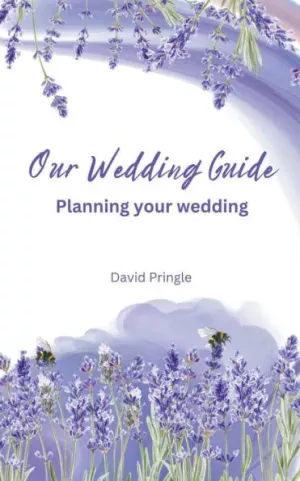If you click on the links we provide, we may receive compensation.
How to make decisions when Planning your Wedding
When making wedding planning decisions consider what you both want, now and into the next five years
Knowing how to make decisions about your wedding plans will set the tone for decision-making throughout your marriage.
Making wedding planning decisions should include consideration of what you and your partner want both now and into the next five years. Work together to determine how your priorities and dreams can be complementary. Separate needs from wants to help prioritize what is important.

Each step in the wedding planning process calls for decisions to be made.
Keep in mind that your wedding is one day and one event. Your marriage is for a lifetime.
There are hundreds of options and decisions to be made when planning a wedding. Knowing how to make decisions will help you filter through the voices of family, friends, members of the wedding party, the officiant, and your partner. Take all of the advice and comments into consideration. You and your partner will be better equipped to make decisions after listening to the wisdom of others.
5 Things to keep in mind that will set a framework for how to make decisions about your wedding
1. If money were no object, what would you want for your ideal wedding?
2. Since money is probably a factor in making decisions, how important is it to have, and stick to a budget? Are you willing to make compromises to spend more in one area but less in another?
3. Do you value your partner's voice, opinions, desires, and needs, and how do you prioritize or align your partner's ideas with your own?
4. Is there a correlation between cost versus value in your selections? In other words, does a high-priced item have long-lasting value implications? Will you have lasting memories of joy or regret in choosing a less or more expensive element?
5. Do you know what you are trying to achieve? Is the goal intimacy, a fairy tale look and feel, simplicity, indulgence, or having the reality of your actual wedding mirror your dream wedding?
How to make decisions working together with you partner
Saying yes to one thing means saying no to other things. While we may want to have it all, some factors limit "having it all", factors that include time and place as well as preference and money. Your decisions will unlock some doors of opportunity but also close other doors of possibilities. You hold the keys to unlock your future.

Working together . . .
One of the great things about planning your wedding is that it sets the stage for how you will work together in your marriage and into the future. You will discover how to make decisions based on what works for each of you regarding communication styles.
Through the planning process, you will discover your values when it comes to compromise, priorities, immediate versus long-term gratification, the art of negotiation, how to determine personal individuality as well as unity as a couple, how to manage financial matters, and what are the non-negotiables.

If in the process of making wedding planning decisions you become stressed to the point that it impacts your relationship as a couple, it is always good to first talk about it together.
It is also a good idea to seek out a professional who can guide you both in sorting through the complexities and emotions of what is taking place.
The importance of seeking a highly skilled and highly qualified resource cannot be emphasized enough. Many who have qualifications and education as a counselor are less than effective.
Arrange for an introductory meeting with whomever you select so that you will better understand the approach, process, and if the resource is a good fit for the two of you.

Counseling or a marriage guide early in the relationship has great advantages. Working through small issues is much easier than waiting for things to escalate. Becoming familiar with positive relationship-building tools early gives one months and years to practice using these relational aids.
How to make decisions involves communication
Knowing how to make decisions involves knowing how to communicate about your wedding plans with your partner. Your approach to making decisions will set the tone not only for your wedding but also for your relationship long after your wedding day. You want your wedding day to be more than an event. Your special day should be an experience foundational to how you build your relationship together.
Communicating about your wedding plans sets the tone for your entire wedding experience
There are so many decisions to be made and things to get done in planning a wedding. A well-thought-through wedding plan will reflect your personality and relationship in every aspect of the wedding from the wedding invitations, decorations, music, toasts, and tributes, right through to the threshold of the honeymoon. That is why you and your partner need to be together in making every decision. Your wedding is a reflection of each of you, and both of you collectively.

Being together, or aligned, in communicating about your wedding plans does not necessarily mean total agreement. Being together in decision-making means that you have shared ideas, listened to one another, and come to a mutual consensus. Consensus is about accepting the decision of the other willingly and without remorse. It does not mean total agreement. Consensus means you have decided to put aside your own wishes, and move forward. The foundation of consensus-building and decision-making is effective communication.
The best part of planning your wedding together is discovery. It is the process of revealing and nurturing your growing relationship. Communication is the tool to help you discover the gifts that you each possess, and give you more reasons to fall in love over and over again. Use communication to build your relationship.
Helpful tips for communicating about your wedding plans
Talk to your partner as soon as you are engaged. Better yet, learn how to communicate effectively before you are engaged.

In communicating about Your wedding plans with your partner it is critical to listen to each other’s ideas in a way that the other feels heard.
Determine together how decisions will be made. Allow for differences in your personalities. Some partners may want to have a large part in making decisions. Others are comfortable with whatever you decide. Some will want to be informed. Others will not want to know about all of the details, just the big picture. We are all individuals and conversations and expectations need to be tailored toward what is meaningful to the other person. One member of the partnership may be more passionate about some aspects of the planning, and the other member may have different priorities. Capitalize on your differing interests, passions, and strengths. So long as neither of you feels left you, you will both be able to move forward together.

Who of your family and friends will want to have input solicited or otherwise? Know that anxiety about losing control will happen. Talk about it with your partner. Develop the confidence of knowing that you and your partner are the decision makers and in charge. This will help you relax, be nonreactive when you hear conflicting opinions, and enable you to calmly and confidently move toward your goal of creating the perfect wedding experience.
Keep all of your relationships with family and friends open and intact from your perspective. If anyone is upset with your choices, that is not your problem. But it is your responsibility to listen to them, to be kind, and to give yourself time. Nothing needs to be decided on the spot. Over time things will work out and the drama of those critical decisions and interactions will fade. This will be especially true if you continue to stay positive, and acknowledge and be genuinely grateful for the good intentions of others. At the right time, share your decisions. Then gently move forward as you wish.
5 Things to consider to make communicating more effective
1. Part of knowing how to make decisions is knowing when and where to make decisions. Pick a time and place. In real estate, they say the three most important factors are, location, location, location. In having a meaningful and important conversation the three most important factors might be timing, location, and being emotionally grounded. Find a time and place when you are:
- feeling relaxed
- free of time restriction
- unlikely to be interrupted
- able to be free of mobile phone and other electronic distractions

2. Think through the purpose of the conversation in advance, and determine how you might open the dialogue. Are you wanting to vent and share your feelings, do you want your partner to be more engaged in a process or decision, or do you want a specific outcome or decision? The following examples state the issue up front, do not make assumptions, invite open dialogue, and create a sense of mutuality in decision-making. Examples include:
- I was thinking about the wedding reception and wondered if you had given any thoughts about the seating arrangement for a few of our special guests.
- You have been very generous about some of the things that are expensive in planning our wedding. There is something that I would very much like to include and wonder if there are other areas where we could trim some of the costs to stay within our budget.
- I wanted to share with you some things that your mom has her heart set on regarding our wedding plans. I am hoping that you and I can come up with what we think is reasonable, and together share with her our thoughts. It may be that she will be disappointed so we need to consider how best to approach this together.
3. How to make decisions is being aware of your partner’s nonverbal cues. Nonverbal cues will give you an idea of how the conversation is impacting your partner. By paying attention to these cues you can pace the conversation, give opportunity for your partner to share what he/she is feeling, and ask deeper questions to determine how the conversation can progress.

4. Resist the temptation to make assumptions about how your partner will react to information and discussions that might be sensitive. This will manage your own anxiety. Stress is transferable. If you are anxious, your partner may pick up on this which will in turn create increased anxiety for both of you. Try not to make more of the words that are exchanged. Take things at face value.
5. Listen more than talk. Communicating with your partner about your wedding plans will be so much more meaningful if you let the other person talk. They will feel heard. It is up to you to manage the conversation. If you are patient, take your time, and are relaxed, you will be able to bring the conversation to an outcome that is much more in keeping with your goal. Your partner will feel like a partner, as well as a participant.
Wise words from wise people
Over the years I have had the privilege of knowing a few very wise people. Regarding communication and relationships, the following are three critical things they shared with me. These wise words will be useful in communicating with your partner about your wedding plans.
1. If you speak once or twice during a critical conversation, you will be heard. If you constantly talk and say the same thing over and over again, you will diminish your opportunity to be truly heard.
2. Speak into the listening of the other person. In other words, say things in a way in which the other person can hear you. Speaking to be understood requires you to listen to your own words before they come out of your mouth. Ask yourself, am I being clear? Have I stated my point succinctly? Am I speaking slowly and calmly to enable the other person to absorb and process the point that I am trying to make?
3. Bring out new points that are directly related to the outcome that you want. Avoid repeating the same argument over and over again. Avoid just speaking louder and with more emotion. This does not bring anything of value to the conversation but only emphasizes that you are not listening to the other person. You are only becoming more emphatic about YOUR position. Using your intelligence, sharing your wisdom, exercising your creativity, and basing your position on common sense and practicality will help bring out the value of your point of view.
4. Allow time. Communicating with your partner about decisions that need to be made is a process. Unless it is a crisis where immediate action is needed, nothing needs to be decided “right now.” Share at the beginning that you are not expecting a decision right now, but rather presenting some thoughts for consideration. Try to keep the conversation open to allow time for the other person to consider what you have said. Change takes time, and a change in perspective will evolve. After a day or two, come back to the question and ask your partner, “Have you given any more thought to . . . . “
5. Being kind is foundational to knowing how to make decisions. Your relationship is more important than a single decision. Be willing to give and take. You are setting the patterns that will follow you through the initial months and years of your marriage.




